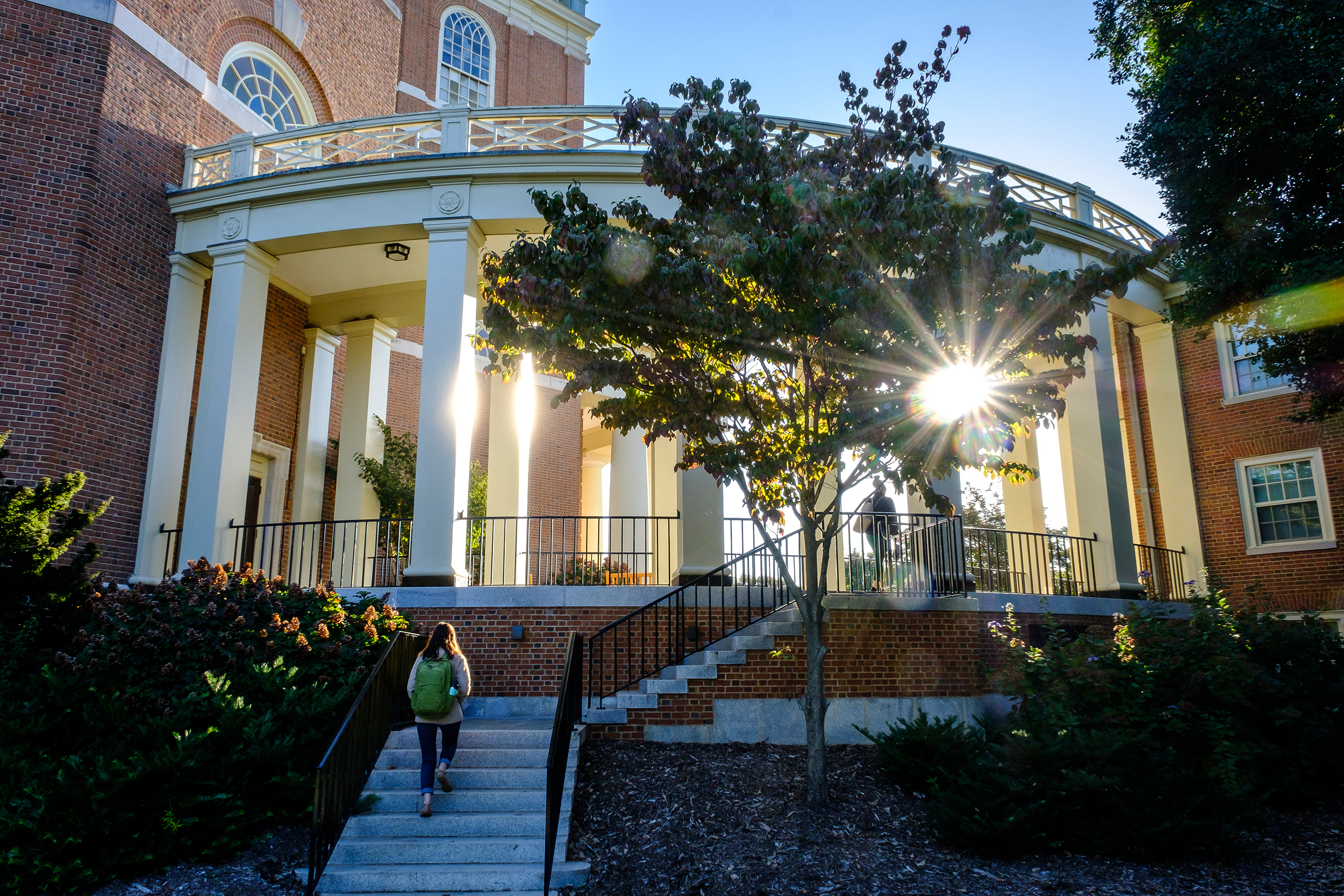WFU Class of 2000 First to Benefit From New Plan
When the Class of 2000 arrives at Wake Forest University Aug. 21, they will be the first to benefit from a new plan that greatly expands the university’s use of computer technology as part of an extensive campaign to enrich undergraduate education.
In Wake Forest’s history, they will be remembered as the freshman class that made powerful laptop computers as common as pens and notebooks on campus. The plan will provide each of the approximately 950 freshmen with an IBM ThinkPad 365XD that they can use to reach the Internet from practically any place at the liberal arts university–classrooms and residence halls included.
At their request, about half of the freshmen received their ThinkPads at home this summer, allowing themselves time to grow familiar with the computers before classes start Aug. 28. The university provided the students with a specially-created compact disc that walks them through the basics of the computers and their software, including Windows 95. Others will pick them up Aug. 26 and attend ThinkPad introductory sessions Aug. 27.
The Plan for the Class of 2000 also gives students more faculty, specially-designed seminars to strengthen their critical-thinking skills, a year-long series of events developed around a common theme, continuing improvements to facilities, and much more.
“It’s an exciting time at Wake Forest,” said Paul Escott, dean of the College.
“The idea behind the undergraduate plan is to reinforce our commitment to the student, to increase our attention on the individual student,” added Escott.
“Our focus has always been on the student, but this plan sharpens it further with its emphasis on individualized instruction, small classes and mentoring by senior faculty.”
The Plan for the Class of 2000, drawing its name from the first class to benefit fully from it, won the approval of university trustees in April 1995. That same spring, faculty voted overwhelmingly in support of two key provisions of the plan–more computer technology in teaching (including laptop computers) and first-year seminars.
As the fall term’s Aug. 28 opening nears, preparations for the plan’s kickoff are drawing to a close.
“This is the end of a long, very busy process for us,” said Jay Dominick, assistant vice president for information systems. “We’ve been charged with networking the campus, and we’ve been working non-stop at it since May of 1995.”
Just this summer, approximately 24 network-related projects were managed by Dominick’s department. They included completing the extension of computer wiring to all residence halls and many classroom buildings, installing a high-speed fiber optic network around campus, outfitting dozens of classrooms with multimedia equipment, and installing a new supercomputer to handle the rapid growth of electronic mail on campus and other computer network needs.
More projects are ahead, including bringing high-speed network connections to two more classroom buildings, the installation of yet another supercomputer, and the renovation of more classrooms to accommodate the latest in multimedia equipment.
For students, one of the most visible features of the new technology will be new interactive classroom software. LotusNotes groupware has been adapted for the university to enable faculty and students to interact over the network, exchange files, hold virtual discussion groups and collaborate on class projects.
The groupware is expected to be used in some of the first-year seminars that will become an important part of every freshman’s experience at Wake Forest. Every freshman is expected to enroll in one of the approximately 60 seminars offered this year. With about 15 students in each seminar, the special courses are intentionally kept small to encourage intensive participation by every student.
“Faculty members are fashioning the seminars to develop the analytical and critical- thinking skills of our freshmen early in their Wake Forest years,” said Escott. “We want to sharpen their ability to state clearly their ideas in several formats, including those offered by the modern tools available to us now.”
One of those offered this fall, “The Economist’s Way of Thinking,” has been designed by its instructor, Provost David G. Brown, to be “paperless.” It will rely heavily on the new LotusNotes groupware for class discussions and reviews of writings produced by students individually and in teams.
While new seminars and computers have, perhaps, become the plan’s most identifiable features for many, the plan will kick off this fall with a wide range of other additions to the undergraduate experience.
“From the plan’s earliest stages, it was intended by its designers–faculty, administrators and students–to address a number of needs,” Escott explained.
“A primary concern of planners was to increase faculty contact with students, to provide faculty with greater opportunities to work closely with students,” he added.
Hiring additional faculty will enable the university to meet that goal. Eventually, the plan will bring 40 more faculty to the campus. Fourteen arrive this fall.
Four will be minorities, addressing the university’s goal of adding more minority professors to its ranks.
The plan also called on the university to continue upgrading its teaching facilities. For instance, Tribble Hall, one of the university’s largest classroom buildings, reopens this fall after a top-to-bottom renovation. In addition to bringing network connections to the building’s classrooms and turning one of its lecture halls into a state-of-the-art teleconferencing facility, the plan played a part in its repainting, reflooring and substantial mechanical improvements.
It is expected that the entire university community, as well as others outside the university, will enjoy a plan feature that suggests the university adopt a central theme each year for a series of events, including a major symposium. This year, in what is being billed as the Year of the Arts, the university will host activities from fall to spring to celebrate the arts. September events feature opera legend Beverly Sills and Wake Forest professor, poet and playwright Maya Angelou.
Categories: Experiential Learning, University Announcements
Media Contact
Wake Forest News
media@wfu.edu
336.758.5237



